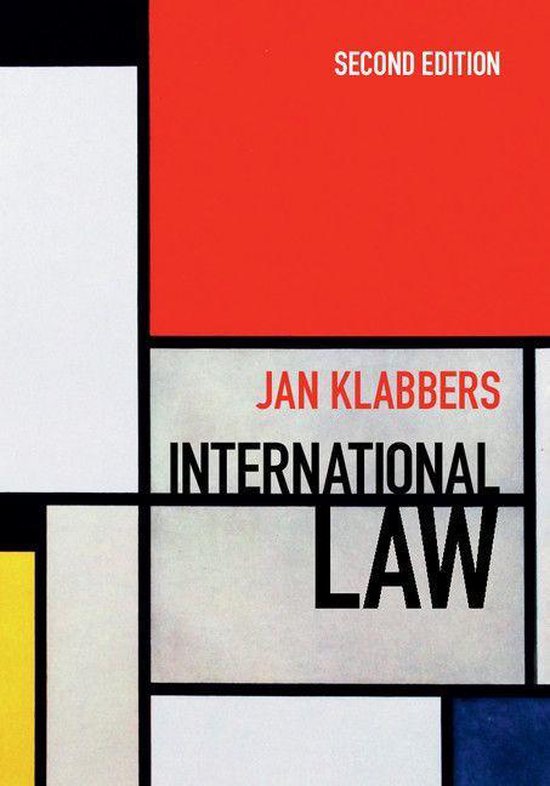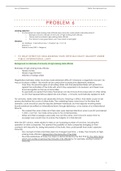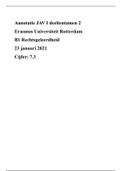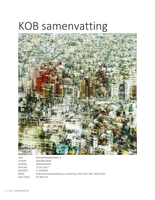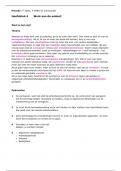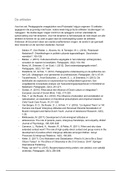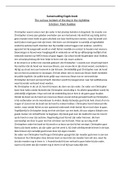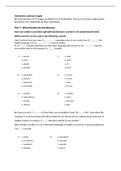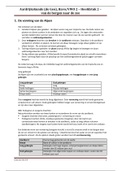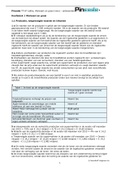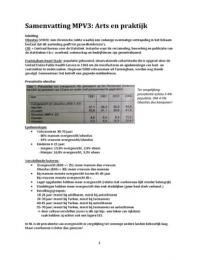Law of Immunities Public International Law
PROBLEM 6
Learning objective:
1. To what extent do high-ranking state officials enjoy immunity under public international law?
o Background and rationale of immunity of high-ranking state officials
o Former and incumbent high-ranking state officials
o The Warrant-case (goed lezen want heel arrest is belangrijk)
Literature:
- Jan Klabbers, ‘International Law’: Chapter 5 (p. 110-113)
- E-lessons: 11
- Warrant-case (DRC v. Belgium)
1 TO WHAT EXTENT DO HIGH-RANKING STATE OFFICIALS ENJOY IMMUNITY UNDER
PUBLIC INTERNATIONAL LAW?
Background on rationale of immunity of high-ranking state officials
Examples of high-ranking state officials:
- Heads of state
- Heads of government
- Ministers of foreign affairs
Negotiations between states would be made extremely difficult if whenever a negotiator was sent, he
was put in prison or killed – this would not be conductive to productive diplomatic relations.
- Over time, the practice grew of providing states and their plenipotentiaries with protection
against the authorities of the state with which they supposed to do business, and these have
found recognition in the law of immunities.
- It is generally accepted that states themselves can be immune from prosecution in other states,
as can their representatives (diplomats and others) → immunity automatically applied to both
For centuries, states were held to be absolutely immune, meaning, in effect, that states could not be
prosecuted before the courts of other states. The underlying theory owed much to the idea that
domestic courts should be used for disputes between individuals, but that disputes involving states
should somehow be settled on international level, through diplomacy, or by means of an international
tribunal.
- This worked fine when states and their rulers were deemed identical; when Louis XIV proclaimed
‘L’état, c’est moi’, he made some sense to his contemporaries.
- States and their sovereigns were really one and the same, and it stood to reason that no
sovereign ruler would have to endure the indignity of a trial abroad.
After the 20th century, states started to take on an increasing number of functions, including the
operation of state companies. This opened the possibility of state companies reneging on their
contracts with impunity for, being instruments of the state, they could benefit from state’s absolute
immunity.
- Our concept of state and state rulers has changed over time → today, the immunity of high-
ranking state officials is derived from the immunity of the state.
- The inter-relatedness of those two topics is demonstrated by the fact that it is the state alone
which can confer or remove the immunity of its officials by, for example, issuing a waiver of
immunity.
1
PROBLEM 6
Learning objective:
1. To what extent do high-ranking state officials enjoy immunity under public international law?
o Background and rationale of immunity of high-ranking state officials
o Former and incumbent high-ranking state officials
o The Warrant-case (goed lezen want heel arrest is belangrijk)
Literature:
- Jan Klabbers, ‘International Law’: Chapter 5 (p. 110-113)
- E-lessons: 11
- Warrant-case (DRC v. Belgium)
1 TO WHAT EXTENT DO HIGH-RANKING STATE OFFICIALS ENJOY IMMUNITY UNDER
PUBLIC INTERNATIONAL LAW?
Background on rationale of immunity of high-ranking state officials
Examples of high-ranking state officials:
- Heads of state
- Heads of government
- Ministers of foreign affairs
Negotiations between states would be made extremely difficult if whenever a negotiator was sent, he
was put in prison or killed – this would not be conductive to productive diplomatic relations.
- Over time, the practice grew of providing states and their plenipotentiaries with protection
against the authorities of the state with which they supposed to do business, and these have
found recognition in the law of immunities.
- It is generally accepted that states themselves can be immune from prosecution in other states,
as can their representatives (diplomats and others) → immunity automatically applied to both
For centuries, states were held to be absolutely immune, meaning, in effect, that states could not be
prosecuted before the courts of other states. The underlying theory owed much to the idea that
domestic courts should be used for disputes between individuals, but that disputes involving states
should somehow be settled on international level, through diplomacy, or by means of an international
tribunal.
- This worked fine when states and their rulers were deemed identical; when Louis XIV proclaimed
‘L’état, c’est moi’, he made some sense to his contemporaries.
- States and their sovereigns were really one and the same, and it stood to reason that no
sovereign ruler would have to endure the indignity of a trial abroad.
After the 20th century, states started to take on an increasing number of functions, including the
operation of state companies. This opened the possibility of state companies reneging on their
contracts with impunity for, being instruments of the state, they could benefit from state’s absolute
immunity.
- Our concept of state and state rulers has changed over time → today, the immunity of high-
ranking state officials is derived from the immunity of the state.
- The inter-relatedness of those two topics is demonstrated by the fact that it is the state alone
which can confer or remove the immunity of its officials by, for example, issuing a waiver of
immunity.
1

